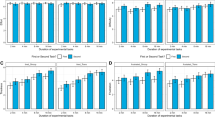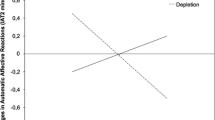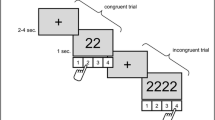Abstract
Working on a task that requires strong self-regulation can deteriorate performance in a subsequent task also involving high self-regulatory demands. Several studies suggest that the consumption of limited self-regulatory resources may account for this effect known as ego depletion. We investigated the influence of expectations about upcoming tasks on self-regulatory performance in two experiments, contrasting tasks with high and low self-regulatory demand. We manipulated expectations by informing participants about the number of tasks to be worked on (Experiment 1) and by varying the number of tasks (Experiment 2). With the expectation of highly demanding tasks no ego-depletion effect occurred. Results show that expecting a continuation of high self-regulatory demand in a sequence of several tasks actually improved performance.


Similar content being viewed by others
References
Baumeister, R. F., Heatherton, T. F., & Tice, D. M. (1994). Losing control: How and why people fail at self-regulation. San Diego: Academic.
Baumeister, R. F., Bratslavsky, E., Muraven, M., & Tice, D. M. (1998). Ego depletion: is the active self a limited resource? Journal of Personality and Social Psychology, 74, 1252–1265. doi:10.1037/0022-3514.74.5.1252.
Bolles, R. C. (1972). Reinforcement, expectancy, and learning. Psychological Review, 79, 394–409. doi:10.1037/h0033120.
Brickenkamp, R., Schmidt-Atzert, L., & Liepmann, D. (2010). d2-R. Test d2 – revision. Aufmerksamkeits- und Konzentrationstest. Göttingen: Hogrefe.
Converse, P. D., & DeShon, R. P. (2009). A tale of two tasks: reversing the self-regulatory resource depletion effect. Journal of Applied Psychology, 94, 1318–1324. doi:10.1037/a0014604.
DeWall, C. N., Baumeister, R. F., Stillman, T. F., & Gailliot, M. T. (2007). Violence restrained: effects of self-regulation and its depletion on aggression. Journal of Experimental Social Psychology, 43, 62–76. doi:10.1016/j.jesp.2005.12.005.
Eisenberger, R. (1992). Learned industriousness. Psychological Review, 99, 248–267. doi:10.1037/0033-295X.99.2.248.
Eisenberger, R., & Masterson, F. A. (1983). Required high effort increases subsequent persistence and reduces cheating. Journal of Personality and Social Psychology, 44, 593–599. doi:10.1037/0022-3514.44.3.593.
Eisenberger, R., Masterson, F. A., & McDermitt, M. (1982). Effects of task variety on generalized effort. Journal of Educational Psychology, 74, 499–505. doi:10.1037/0022-0663.74.4.499.
Faul, F., Erdfelder, E., Lang, A.-G., & Buchner, A. (2007). GPower 3: a flexible statistical power analysis program for the social, behavioral, and biomedical sciences. Behavior Research Methods, 39, 175–191.
Hagger, M. S., Wood, C., Stiff, C., & Chatzisarantis, N. L. D. (2010). Ego depletion and the strength model of self-regulation: a meta-analysis. Psychological Bulletin, 136, 495–525. doi:10.1037/a0019486.
Heim, A. W. (1955). Adaptation to level of difficulty in intelligence testing. British Journal of Psychology, 46, 211–224. doi:10.1111/j.2044-8295.1955.tb00541.x.
Helson, H. (1964). Adaptation-level theory: an experimental and systematic approach to behavior. New York: Harper & Row.
Hofmann, W., Rauch, W., & Gawronski, B. (2007). And deplete us not into temptation: automatic attitudes, dietary restraint, and self-regulatory resources as determinants of eating behavior. Journal of Experimental Social Psychology, 43, 497–504. doi:10.1016/j.jesp.2006.05.004.
Inzlicht, M., & Schmeichel, B. J. (2012). What is ego depletion? toward a mechanistic revision of the resource model of self-control. Perspectives on Psychological Science, 7, 450–463. doi:10.1177/1745691612454134.
Kehlmann, D. (2005). Die Vermessung der Welt. Reinbek: Rowohlt.
Martijn, C., Tenbült, P., Merckelbach, H., Dreezens, E., & de Vries, N. K. (2002). Getting a grip on ourselves: challenging expectancies about loss of energy after self-regulation. Social Cognition, 20, 441–460. doi:10.1521/soco.20.6.441.22978.
Muraven, M., & Baumeister, R. F. (2000). Self-regulation and depletion of limited resources: does self-regulation resemble a muscle? Psychological Bulletin, 126, 247–259. doi:10.1037/0033-2909.126.2.247.
Muraven, M., Shmueli, D., & Burkley, E. (2006). Conserving self-regulation strength. Journal of Personality and Social Psychology, 91, 524–537. doi:10.1037/0022-3514.91.3.524.
Park, S. H., Glaser, J., & Knowles, E. D. (2008). Implicit motivation to control prejudice moderates the effect of cognitive depletion on unintended discrimination. Social Cognition, 26, 401–419. doi:10.1521/soco.2008.26.4.401.
Schmeichel, B. J. (2007). Attention control, memory updating, and emotion regulation temporarily reduce the capacity for executive control. Journal of Experimental Psychology: General, 136, 241.255. doi:10.1037/0096-3445.136.2.241.
Turner, M. L., & Engle, R. W. (1989). Is working memory capacity task dependent? Journal of Memory and Language, 28, 127–154. doi:10.1016/0749-596X(89)90040-5.
Tyler, J. M., & Burns, K. C. (2009). Triggering conservation of the self’s regulatory resources. Basic and Applied Social Psychology, 31, 255–266. doi:10.1080/01973530903058490.
Vohs, K. D., & Heatherton, T. F. (2000). Self-regulatory failure: a resource-depletion approach. Psychological Science, 11, 249-254. doi:10.1111/1467-9280.0025.
Wright, R. A., Junious, T. R., Neal, C., Avello, A., Graham, C., Herrmann, L., Junious, S., & Walton, N. (2007). Mental fatigue influence on effort-related cardiovascular response: difficulty effects and extension across cognitive performance domains. Motivation and Emotion, 31, 219–231. doi:10.1007/s11031-007-9066-9.
Author information
Authors and Affiliations
Corresponding author
Rights and permissions
About this article
Cite this article
Tempel, T., Schwarzkopp, T. & Mecklenbräuker, S. The Undepleted Ego: Self-Regulatory Adaptation in Multiple Task Sequences. Curr Psychol 35, 316–324 (2016). https://doi.org/10.1007/s12144-014-9296-4
Published:
Issue Date:
DOI: https://doi.org/10.1007/s12144-014-9296-4




